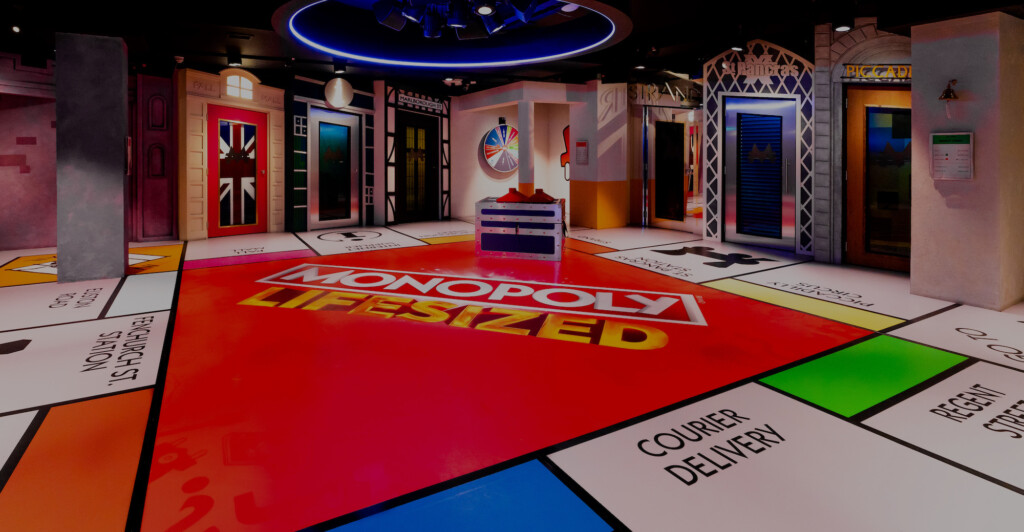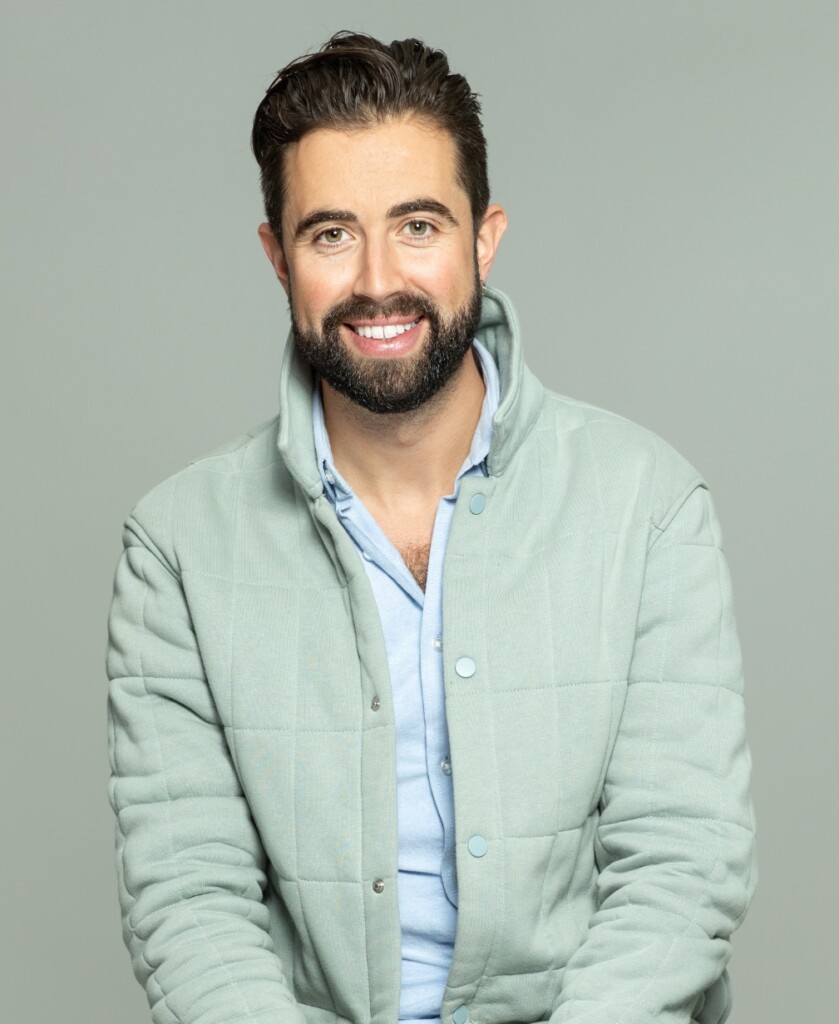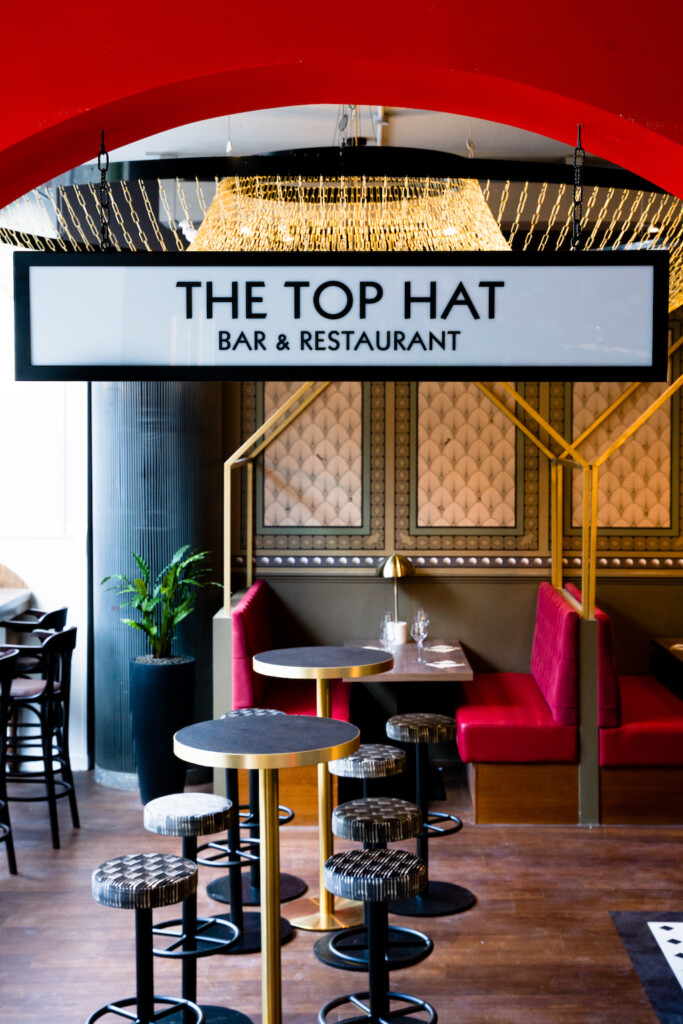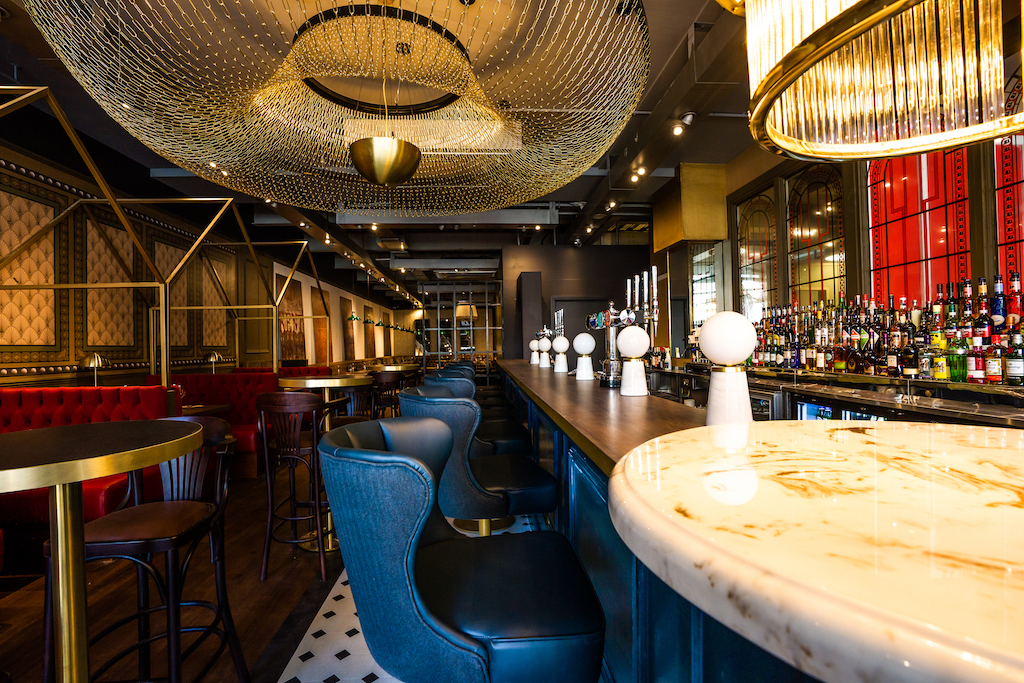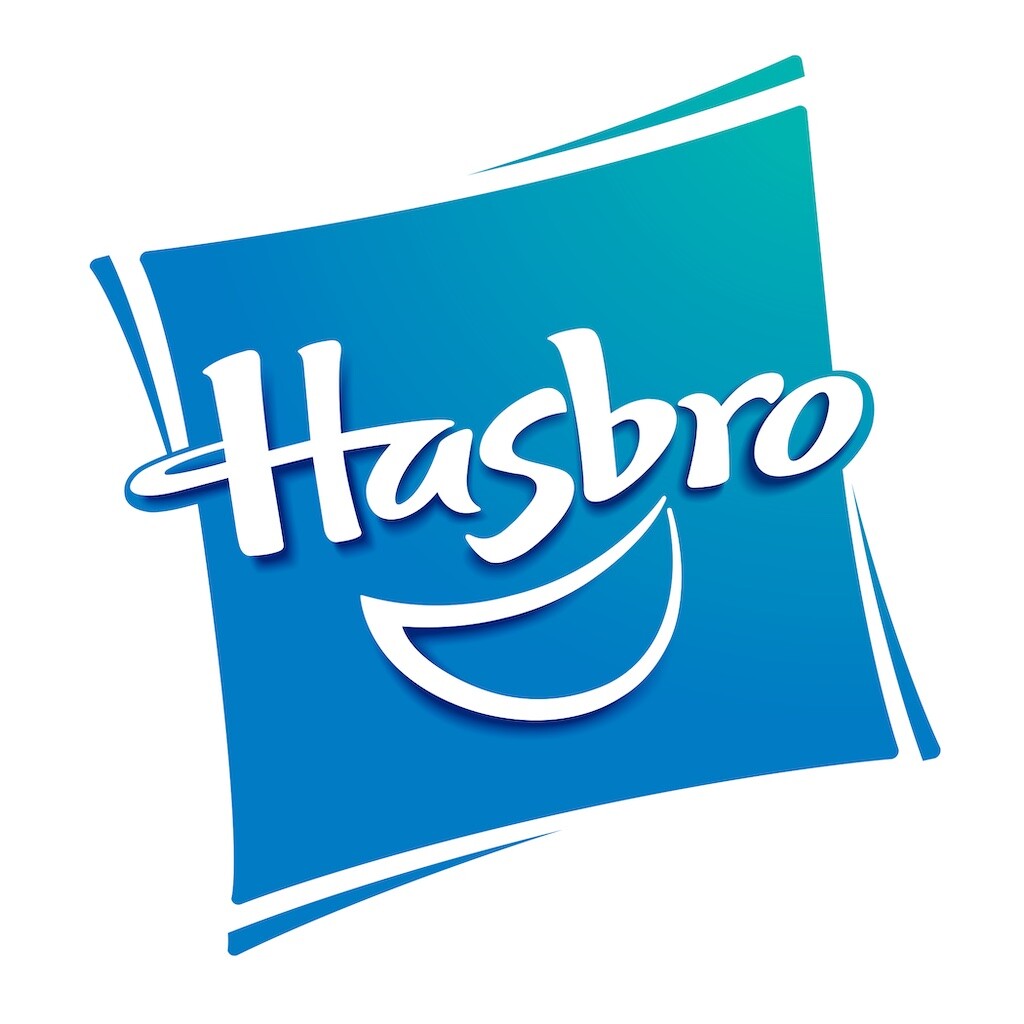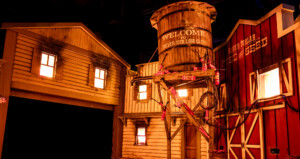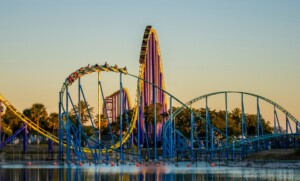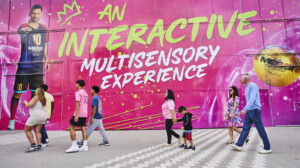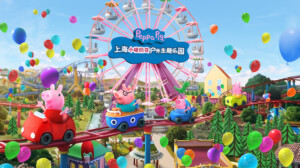MONOPOLY Lifesized is an immersive, interactive team version of the timeless family favourite. Winner of the Best Location-Based Entertainment Award at The Licensing International Excellence Awards in 2022, its London iteration is located on Tottenham Court Road, but it is poised to sweep across the world.
In December 2022, London-based production company The Path Entertainment Group announced a new partnership with the Al Hokair Group, as part of its existing licensing agreement with global branded entertainment leader, Hasbro, to bring Monopoly Lifesized to millions of people in Riyadh, Saudi Arabia.
Origins in theatre
David Hutchinson, CEO of The Path Entertainment Group, talked to blooloop about the concept and its inception, as well as what the future holds.
“My background is in musical theatre,” he begins. “I formed the original company Sellador Worldwide, once I came out of drama school. I was at studying at the Liverpool Institute of Performing Arts, which is a school Paul McCarney set up for training all the people that make performance possible, so got a lot of the production, directing, performing skills.”
Having graduated and set the company up, he then started producing musicals:
“Over the years, they have grown over the years from Fringe at the beginning right up to West End shows in their more recent history. About three or four years ago, I started thinking about how the industry was evolving, and how, while theatre is absolutely my first love, audiences, especially younger audiences, want to have more agency with their night.”
LBE meets gaming meets theatre
It has always been challenging to draw this audience to the theatre:
“We have always struggled,” he says. “Our core demographic in the theatre is the middle-aged to older demographics, specifically female, as it turns out. Younger audiences interact differently with entertainment. They are interested in collecting content in a different way than a traditional theatre show perhaps affords. So, I really started to think about how that was evolving, and about some of the really exciting projects that were emerging in the space.”
As a result, he set up the Path Entertainment Group, specifically to explore location-based entertainment:
“I was interested in looking at the intersection where the world of gaming meets the theatre, meets the location-based experiential world.”
As part of this process, he explains:
“I connected with one of the biggest toys/ board game owners, Hasbro, and did a license with them for Monopoly. To begin with, they envisioned a musical version. We managed to sway away from that version. But, from my traditionally historical theatrical background, that was the entry into this space.”
Monopoly Lifesized
Defining that space, he adds:
“We’re not Punchdrunk [the theatre company formed in 2000 by Felix Barrett]. We’re not narrative-driven. We’re not a promenade theatre producer.”
The company doesn’t slot tidily into the gaming industry space, either:
“You come in and just engage in one game. It’s a mixture, transcending boundaries.”
Monopoly Lifesized is, at its simplest, an immersive, physical version of the world’s favourite family game brand, played on a 15m x 15m life-sized Monopoly board. Players compete in one-of-a-kind challenges for a chance to buy properties, try to stage a heist in Mayfair, compete against a clock to build some of London’s iconic buildings and work to solve a murder mystery or enter the mysterious world of codebreakers.
Guest interactions
Hutchinson comments:
“It’s not theatre – it’s a very different way of working. Your audience interacts with all parts of the performance, walking around, touching everything and experiencing everything. But from the moment they come through the door and go through all the different verticals; retail, food and beverage, we are also drawing from our theatre knowledge and theatrical storytelling. There are live actors. There is a lot of interaction with the characters.
“You’re very much in the world of London, and in all the different rooms there’s a story to be told. The experience pulls from that theatrical background. But also, as we’ve grown and as we continue to learn, it’s a very different sector, a very different setup, and one that has been really interesting and exciting to learn and grow in.”
Monopoly is a universally well-loved and familiar game. He outlines the creative process of turning it into something fresh, physical, and immersive:
“We realised that in creating a location-based production of Monopoly, we would have to add value. People wouldn’t want to just interact in the same way but on a larger scale. Having a big board and throwing dice and playing in a traditional format wouldn’t work. Traditional Monopoly can last into the small hours, anyway.
“Thinking about how we could bring a second element to that is where the idea of all the placemaking around the properties evolved into small games and escape rooms. We also wanted to give people an opportunity to interact with the history of London.”
Theming is key at Monopoly Lifesized
The two-and-a-half-minute games associated with the places named on the board also give a tiny historical flavour of that part of London:
“The challenges are always associated with that, and, obviously, some of the iconic squares, are more complex. You have to escape the Jail, which is a proper cell, with bunk beds and a toilet, for example.”
“As you pass Go, there is a wind tunnel that blows Monopoly money up. You have to grab as much as you can and collect, in physical form, your £200.
“Nothing in the game is a given. If you land on a property, you’ve got to win a challenge to get the right to buy the property. The whole experience is about taking those iconic moments to the next stage. That is something the audience really enjoys interacting with.”
Bringing the concept to new locations
In terms of the expansion strategy, he explains:
“It is really about building an international network of franchise partners. The reason that we’ve focused on certain brands – and we have a couple more of them coming down the line with Hasbro – is because they are internationally recognised. Monopoly is in pretty much every single country, in countless languages and iterations. It’s very much about rolling it out internationally.
“We, as a business, are going to be focusing on the US next. All the brands we’re working with, including Monopoly, originated from the US. Monopoly is a huge brand over there. There are a huge number of city markets in the US that are sufficiently far away from each other to sustain an audience for what is a three to five-year business model, which is what our location-based entertainment projects are.”
Australia, too, he says, is an exciting market:
“Obviously, it’s an English-speaking market. That makes it easy for us, so we are exploring how we can produce and develop ourselves in those markets. The rest is about finding excellent partners who value customer experience, and quality production values, and who understand that what we’re trying to do is position ourselves and these brands in the quality side of the market.
“It’s not popup; it’s not stack high, sell cheap. It’s investing properly in the holistic experience, everything from the beverage top hat bar to the experience on the boards to the retail, et cetera.
“We are looking at partners in the GCC region right now.”
Monopoly Lifesized in Saudi Arabia
The company opened a Monopoly Lifesized in Saudi Arabia just before Christmas:
“That was exciting,” he says. “They built it incredibly quickly. In Saudi Arabia, there’s the willpower and the capital to do things incredibly fast. We are looking at other major markets there. The UAE has a long history of experiences, and the mall culture can help the experience evolve.
“And this is again, where the experience can evolve from high streets to other place-making destinations where there’s a high footfall that wants to interact and experience things differently. The expansion plan is really across most major continents, but with us as a company setting up our shop in the US and Australia.”
It is, he says, particularly exciting since each different market has a different version of the game:
“Whilst we are replicating effectively what we’ve created in London, we’re forever developing the content. In Paris, where we’re in conversation with partners, the Paris board is entirely different. The iconic landmarks are, obviously, different.
“For the teams here at Path Entertainment Group, it doesn’t feel like it’s about just replicating. There’s a really good opportunity to actually learn about different cultures and destinations, to bring in partners that know where the high footfall areas and the major tourist sites are, and to develop and reskin the games. The really exciting thing is that, whilst the product will remain consistent in its setup, the individual content will evolve, which is fun.”
A varied audience
The core demographic for Monopoly Lifesized is 25 to 45-year-olds:
“That’s the absolute sweet spot. However, we have a Sunday morning family experience where we slightly lighten the difficulty level of the games, removing some of the technology.
“It’s tech-heavy, as a rule. The idea is that you don’t need to worry about carrying or counting money; all the banking stuff is digitalised. The games are run via an app. They automatically reset and tell you exactly what your score is, and so on.”
“For the Sunday family experience for youngsters, we want to take away that pressure and allow a little bit more space and room to enjoy those challenges in a slightly more accessible way. The older generations, too: we really want to encourage them to come in and enjoy it as well. This is a 70-year-old brand. It is something that people are aware of from the very top of the age group.”
There is also a significant corporate visitorship:
“The level of corporate engagement, in terms of visitorship, has blown us away. It’s great. At one time we had the entire experience taken over for a day with games going on every hour and a piece going on in the bar restaurant. It’s clearly really catering to that market.”
Playing Monopoly Lifesized as a team
As a family board game, Monopoly can be, at home, divisive. He says:
“In the beginning, people were a little reluctant to bring family members or partners, because they didn’t want to fall out with them. In our version, however, you play in teams of six, so you’re actually on the same team. There’s a playing token played by an actor who is your host who takes you around. I still hear people coming down the stairs out of the game, saying, ‘’Oh, if we hadn’t landed on Mayfair…’ or ‘If we hadn’t had that hotel built …’. There’s still a definite rivalry, but it’s pulled into more of a team-based activity.”
The concept has a nostalgic quality that is very on-trend, as well as its immersive, forward-looking elements. He adds:
“Something we’ve been thinking a lot about is how does one communicate what the experience is? Post-COVID, people think about how they create an experience, but also what the content is beyond that, away from that experience.
“With something like Monopoly, its iconography is everywhere. It has really given us the evolution of thought around how we can continue to inject that brand into everything that we do. With the bar and restaurant, we’ve focused on keeping it classy. We didn’t want it to be something that was garish or in-your-face. We wanted people to enjoy being there.
“Now, we’re thinking about how we can go further with the iconography of the cocktails, or how the food interacts, or some of the fun storytelling around the locations. There is a whole piece there that I think we can explore further, which is fun.”
A good partnership
Additionally:
“As we’ve grown our trust and our relationship with Hasbro, they’ve opened up the creative opportunities with us. They trust what we’re doing, and are now saying, ‘Let’s go even further here’, or ‘Let’s try this.’
“It’s been a really nice developing relationship with a massive IP owner, where they’ve gone, ‘We get it; we see what you’re doing, and actually, great: let’s go even further on this one. Let’s give you a bit more scope to experiment over here’. I have to give them all credit for that, because, for brands of that scale and eminence, one of the biggest risk factors is, ‘Are you going to muck up my brand? Are you going to ruin it?’
“They have been really good at trusting in our background in theatre and storytelling. They enjoy and are proud of the Lifesized experience, and are allowing us to even go further, which is exciting.”
For the future, he adds:
“We currently have two further very recognised brands with Hasbro, very different from Monopoly, and are looking at the right market to develop them in. We have been developing those for about two or three years, and hope that we will have one of them, certainly, online by 2024. The partnership with Hasbro goes beyond Monopoly. The partnership is great and has developed with their trust in us, and our trust in them. They are a really good partner.”
Proving the appeal of Monopoly Lifesized
The fact that Hutchinson and his Path Entertainment Group Team have made such a success of Monopoly Lifesized to this point must prove Hasbro’s trust is well founded.
He agrees:
“We came into what was a former stationery shop, and created a concept which had never been proven – though we had put it through quite a lot of user and ideas testing – during perhaps the least optimal conditions, when it comes to COVID and, currently, the cost of living crisis and all the other things that we’re all battling through. And the idea has proved itself to be sustainable, which is a huge testament to everyone that I work with. It also says a lot about the condition of where we all are in the UK, I think, despite the fact it’s very tough.”
“Having been cooped up inside for a year and a half, people want to go out. They want to make memories, interact with friends and family and have an experience where they know they’ll have a good time. And that, putting aside all the tricky conditions, is why this has come at the right point. It is something that people are really engaging with and are seeking to do. Especially in the wet January and February evenings.”
Immersive trend shows no sign of stopping
In closing, he adds some predictions born of his insights into immersive entertainment:
“I feel that with the immersive market over the next years, there will be some level of consolidation, and some level of genuine investment in the scale of what this market could be.
“I’ve found that immersive production lies in a slightly grey area between attractions and theatre. A lot of IP holders are really excited about it and see LBE as a great thing. But they have very small resources in-house when it comes to working on those projects. It tends to fall between their consumer products team and their theatre team.”
“I think that on the back of a lot of experiences – by no means are we taking credit, but on the back of the increasing number of the really great number of experiences in this space – there is going to be a lot more attention from the IP owners to the potential of this space. Within that, the opportunity and the gravity around the players, the producers and the freelance practitioners that are involved are going to scale up. It’s going to become a more significant part of the entertainment scene and culture.
“The increase in engagement and attendance in terms of location-based and immersive entertainment is growing exponentially faster than other mediums in a similar format. I feel there will be real attention now to what this is. And so, within that, we will get some really amazing new talent into this part of the industry.
“There’s still a whole lot of stock out there of empty buildings, empty mall spaces, and empty high streets. It’s not a bad thing. This is where leisure entertainment has a role to play in developing and bringing people back to the high street. That’s my prediction.”
